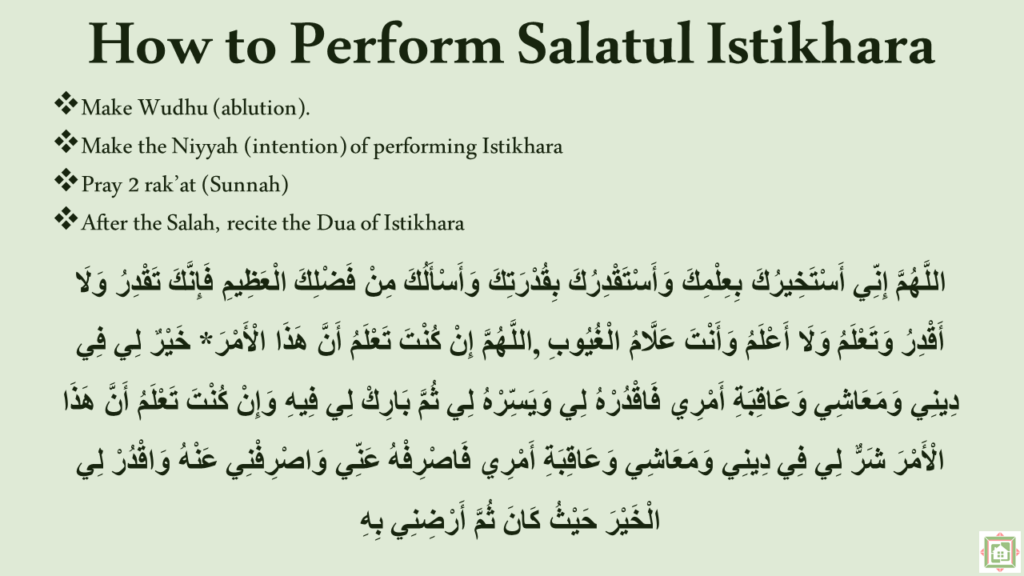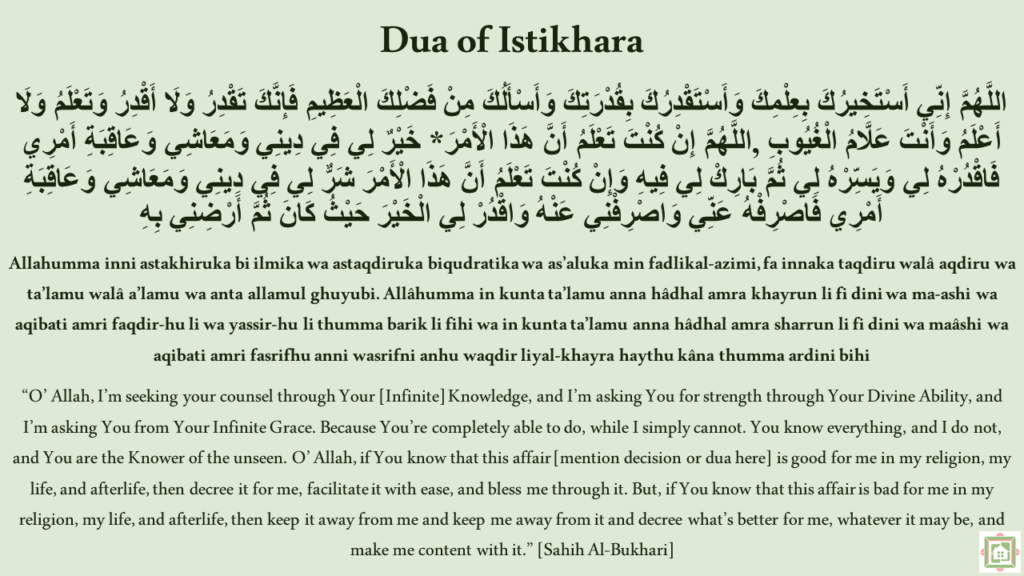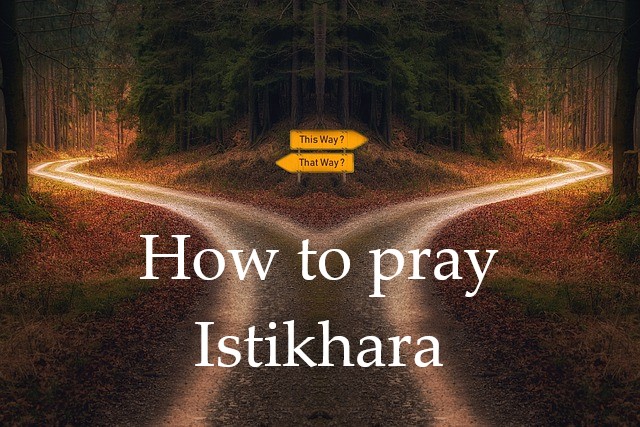Often times in life we find ourselves at crossroads, unsure of which path to take, afraid of making a mistake. At moments such as these, Allah, perfect as He is, blessed the Muslim ummah with Salat Al-Istikhara. Jabir, a companion of the Prophet (PBUH), stated that the Messenger of Allah (PBUH) taught them to perform the Istikhara prayer if anyone intended to do anything.
Narrated Jabir:
The Prophet (ﷺ) used to teach us the Istikhara for each and every matter as he used to teach us the Suras from the Holy Qur’an. (He used to say), “If anyone of you intends to do something, he should offer a two-rak`at prayer other than the obligatory prayer, and then say: ‘Allahumma inni astakhiruka…(Dua of Istikhara)” Then he should mention his matter (need).[Sahih Al-Bukhari]
The Proper Way to Perform Istikhara
Salat Al-Istikhara, which literally means a prayer seeking counsel from Allah, is a voluntary (Sunnah) prayer with 2 rak’ats (units) that any Muslim can observe at times of indecision.
Prerequisites of Istikhara
In the face of a decision-making process, you may first weigh the costs and benefits of one decision as opposed to the other. You may also seek counsel of trustworthy persons who are well-informed on the topic at hand. Thereafter, you could observe the Istikhara salah.
Performing Istikhara


- Firstly, as always, make Wudhu (ablution).
- Make the Niyyah (intention), that you are performing Istikhara.
- Pray 2 rak’at (Sunnah) as you usually do, with Surah Fatihah and another surah for each rak’at.
- Once you have concluded the prayer with the Salaam, recite the Istikhara dua provided below, as was the practice of Prophet Muhammad (PBUH)
Istikhara Dua (with English Transliteration & Translation)


اللَّهُمَّ إِنِّي أَسْتَخِيرُكَ بِعِلْمِكَ وَأَسْتَقْدِرُكَ بِقُدْرَتِكَ وَأَسْأَلُكَ مِنْ فَضْلِكَ الْعَظِيمِ فَإِنَّكَ تَقْدِرُ وَلَا أَقْدِرُ وَتَعْلَمُ وَلَا أَعْلَمُ وَأَنْتَ عَلَّامُ الْغُيُوبِ ,اللَّهُمَّ إِنْ كُنْتَ تَعْلَمُ أَنَّ هَذَا الْأَمْرَ* خَيْرٌ لِي فِي دِينِي وَمَعَاشِي وَعَاقِبَةِ أَمْرِي فَاقْدُرْهُ لِي وَيَسِّرْهُ لِي ثُمَّ بَارِكْ لِي فِيهِ وَإِنْ كُنْتَ تَعْلَمُ أَنَّ هَذَا الْأَمْرَ شَرٌّ لِي فِي دِينِي وَمَعَاشِي وَعَاقِبَةِ أَمْرِي فَاصْرِفْهُ عَنِّي وَاصْرِفْنِي عَنْهُ وَاقْدُرْ لِي الْخَيْرَ حَيْثُ كَانَ ثُمَّ أَرْضِنِي بِهِ
*Mention your dua or decision here
Allâhumma inni astakhiruka bi ilmika wa astaqdiruka biqudratika wa as’aluka min fadlikal-azimi, fa innaka taqdiru walâ aqdiru wa ta’lamu walâ a’lamu wa anta allamul ghuyubi. Allâhumma in kunta ta’lamu anna hâdhal amra khayrun li fi dini wa ma-ashi wa aqibati amri faqdir-hu li wa yassir-hu li thumma barik li fihi wa in kunta ta’lamu anna hâdhal amra sharrun li fi dini wa maâshi wa aqibati amri fasrifhu anni wasrifni anhu waqdir liyal-khayra haythu kâna thumma ardini bihi.
“O’ Allah, I’m seeking your counsel through Your [Infinite] Knowledge, and I’m asking You for strength through Your Divine Ability, and I’m asking You from Your Infinite Grace. Because You’re completely able to do, while I simply cannot. You know everything, and I do not, and You are the Knower of the unseen. O’ Allah, if You know that this affair [mention decision or dua here] is good for me in my religion, my life, and afterlife, then decree it for me, facilitate it with ease, and bless me through it. But, if You know that this affair is bad for me in my religion, my life, and afterlife, then keep it away from me and keep me away from it and decree what’s better for me, whatever it may be, and make me content with it.” [Sahih Al-Bukhari]
According to Al-Nawawi, one can pray Istihara (i.e. make the Dua of Istihara) after two rakahs of any regular Sunnah prayer (for example the Zuhr Sunnah prayers), or after two rakahs of any voluntary (Nafl) prayers whether they are regularly performed or not. However, it is required to make the intention (Niyyah) before said prayers.
The Outcome of Istikhara
Contrary to popular belief, the result of Istikhara does not come in the form of a dream, visions or feelings. Rather the proper implementation of Istikhara is that after making Istikhara (i.e. the Salah & Dua), one should proceed with whatever course of action seems most appropriate based on the counsel he/she has sought, or his/her best judgement. As is stated in the Dua, if that course of action is what is best for him/her, Allah will make it easy for him/her to achieve, or even if there are obstacles, he/she will eventually achieve it. If it is not good, then Allah will turn him/her away from it one way or the other.
After praying Istikhara and once a decision has been made and acted upon, it is important to remember that you should not doubt your decision as doing so is placing doubt in Allah’s guidance. It is important to put your Tawakkul in Allah & let things follow their natural course. Sometimes things may not work out as you deemed, but maintain the belief that Allah knows what is best for you and is preparing you for something far better. The alternative of course of action may have been worse in the long run, or even in the short term.
Common Questions About Istikhara
What time should I perform the Istikhara prayer?
Istikhara does not have a strictly stipulated time and hence can be performed at any time a person deems necessary. As mentioned before, any of the regular Sunnah prayers can be performed with the intention of Istikhara.
Can I make Istikhara for the same decision more than once?
Yes, you may continue to pray Istikhara until you are satisfied with the course of action you have chosen.
Is it permissible to recite the Istikhara dua without praying the 2 rak’at?
Yes. Although the Prophet of Allah (PBUH) made mention of performing the two rak’at, just the dua would be sufficient when one is constrained for time or unable to pray under the circumstances. More information about this can be found here.
I am confident in my decision. Can I still pray Istikhara?
Yes. This is a good practice as it invites Allah’s blessings in the course of action you have chosen, and also ensures that it is not what is bad for you.
And Allah(SWT) Knows Best.





